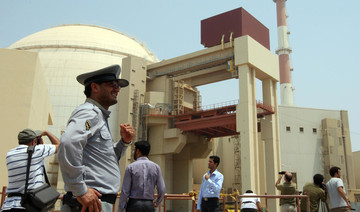TEHRAN: Iranian Foreign Minister Mohammad Javad Zarif said Monday that Iran has filed a complaint with the International Court of Justice to “hold US accountable for its unlawful re-imposition of unilateral sanctions.”
Zarif issued the state following Iran’s Supreme Leader Ayatollah Ali Khamenei’s call for better ties with the world — though not with the US.
“Iran is committed to the rule of law in the face of US contempt for diplomacy & legal obligations. It’s imperative to counter its habit of violating int’l law,” Zarif posted on Twitter.
Zarif did not elaborate but Iranian officials have repeatedly accused the US of imposing illegal sanctions on Iran after pulling out of the nuclear deal as well as breaching the deal before the pullout.
Iran also said that if President Donald Trump wants to negotiate, he’ll have to initiate the call.
The remarks by Foreign Ministry spokesman Bahram Ghasemi came after Trump last week said that with the US increasing sanctions on Iran, “at a certain point they’re going to call me and say ‘let’s make a deal,’ and we’ll make a deal.”
Ghasemi said, however, “maybe someday he will call Tehran and ask for negotiations — this is more likely.”
If Trump calls, it’s not clear whether anyone will answer, with Iran’s top leadership rejecting talks with the US.
The ICJ did not immediately respond to a request for information on the Iranian complaint.
Trump in May said he was unilaterally pulling out of the agreement, known as the Joint Comprehensive Plan of Action, because he felt it wasn’t strong enough and didn’t cover other issues of concern to the US and its allies, such as Iran’s military influence in the Middle East and a ballistic missile program.
The five other world powers in the agreement, Germany, Britain, France, Russia and China, as well as the European Union, have been negotiating with Iran over how to keep it in the deal, which provides incentives in exchange for not pursuing a nuclear weapon.
Iran’s economy is already suffering from the sanctions that Washington re-imposed after walking away from the nuclear agreement, and the US has threatened to punish companies from other nations that continue doing business with Iran.
Push for better ties with world
On Sunday, Khamenei met President Hassan Rouhani and his cabinet on Sunday and spoke of the “necessity of developing diplomacy and relations with foreign countries,” according to a transcript published in English.
He called for “timely, strong and incisive” action as a show of strength to the rest of the world, “particularly Americans,” according his official website on Monday.
Khamenei’s statement recalls a famous slogan from the early days of the 1979 revolution: “Neither East nor West, Islamic republic,” echoing a desire to strike a path independently from the major Cold War powers.
In February, Khamenei surprised observers by saying that Iran now prioritized ties with the East over the West — reflecting the much stronger ties it has developed with Russia and China in recent years.
Even before the US withdrawal, Iran had already been disappointed with the economic benefits of the nuclear deal as it emerged that a raft of remaining US sanctions were preventing the country from establishing international banking ties and other trade links.
He has called on Europe to give “real guarantees” that they can sustain trade with Iran despite US nuclear-related sanctions that will be fully reimposed by November 8.
On Sunday, he called for “courage and determination” from the government as it faced down the threats from the US, and said economic officials were now key to maintaining “hope and morale in people.”






















